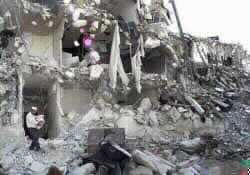3 Palestinians Including Two Boys One of them a 10-year Old, an Israeli Occupation Soldier Killed in West Bank & Gaza Clashes
01/10/2002| IslamWeb
 HIGHLIGHTS: Fighting Surges in Nablus||Occupation Soldiers Attack a House in Nablus & Commandeer another across the Street From Arafat's office in Ramallah||Mahmoud Abbas (Abu Mazin) Critical of Intifadha Tactics While Legislative Council Calls for Reassessment of Performance||Israelis Criticize Sharon's Handling of the Siege in Ramallah|| Yedioth Ahronoth Daily Says 'Key to Every Middle East deal in the Hands of Bush, Him and only Him'|| STORY: Israeli occupation troops killed three Palestinians and an Israeli occupation soldier was shot dead in West Bank and Gaza clashes on Monday a day after Israel, under U.S. pressure, lifted a siege of Palestinian President Yasser Arafat.
HIGHLIGHTS: Fighting Surges in Nablus||Occupation Soldiers Attack a House in Nablus & Commandeer another across the Street From Arafat's office in Ramallah||Mahmoud Abbas (Abu Mazin) Critical of Intifadha Tactics While Legislative Council Calls for Reassessment of Performance||Israelis Criticize Sharon's Handling of the Siege in Ramallah|| Yedioth Ahronoth Daily Says 'Key to Every Middle East deal in the Hands of Bush, Him and only Him'|| STORY: Israeli occupation troops killed three Palestinians and an Israeli occupation soldier was shot dead in West Bank and Gaza clashes on Monday a day after Israel, under U.S. pressure, lifted a siege of Palestinian President Yasser Arafat.
Witnesses and medical officials said Israeli tanks opened fire at youths lobbing stones and petrol bombs at them in the city of Nablus, killing a 10-year-old boy.
A second boy and an Israeli occupation soldier were killed in a fight between Israeli occupation forces and Palestinian Resistance men that raged on after nightfall in central Nablus.
A 50-year-old Palestinian civilian was killed by Israeli tank shrapnel in the Shijaia neighborhood east of Gaza City after Israeli tanks backed by a helicopter chased Palestinian Jihad resistance men, who had ambushed an army patrol with grenades, Palestinian witnesses and hospital sources said.
An occupation army spokesman confirmed an exchange of fire between occupation soldiers and a Palestinian Resistance man. No occupationsoldiers had been injured. He had no information on any Palestinian casualties.
Palestinian witnesses said that during the confrontation in Nablus, Israeli forces surrounded a building in the center of the city.
Under U.S. pressure to avoid upsetting plans for possible war on Iraq, Israeli Prime Minister Ariel Sharon withdrew forces from the Palestinian president's offices on Sunday, a move which drew domestic criticism over the handling of the siege.
Israeli newspapers criticized Sharon's handling of the siege, with the daily Maariv calling it a "colossal failure."
Israel's Yedioth Ahronoth daily wrote: "The lesson for the future: The key to every Middle East deal is in the hands of Bush, him and only him."
However, occupation troops remained in the city of Ramallah and on Monday, Palestinian sources said occupation soldiers had commandeered a house across the street from Arafat's offices as a lookout post
The European Union urged Israel on Monday to lift all its curfews and closures on Palestinian cities to facilitate reform measures and elections which Arafat has pledged to carry out.
A U.N. Security Council resolution had demanded an end to the siege and quick withdrawal from Palestinian cities.
Arafat told reporters in Ramallah on Monday that Israel should now implement the entire resolution "so that we could immediately go back to negotiations and establishing our Palestinian state with holy Jerusalem as its capital."
Far from the fray, Sharon had talks with Russian President Vladimir Putin during a two-day visit to Russia, which had also criticized the siege. Putin said Russia welcomed the decision to end it, adding: "I believe this decision was difficult to take."
Israeli newspapers criticized Sharon's handling of the siege, with the daily Maariv calling it a "colossal failure."
Israel's Yedioth Ahronoth daily wrote: "The lesson for the future: The key to every Middle East deal is in the hands of Bush, him and only him."
ABU MAZIN CRITICAL OF TACTICS IN UPRISING
Palestinians have also become increasingly critical of tactics employed in their uprising launched two years ago after peace talks froze. One leader seen as a potential successor to Arafat said Palestinians were wrong to choose armed struggle.
"Many mistakes that should not have been made were committed, and I frequently said the use of arms during the Intifada was wrong," Mahmoud Abbas told Reuters at the weekend.
The Palestinian Legislative Council, an assembly of lawmakers, also called for a reassessment of the uprising in a statement which urged factions and leaders to halt "the path of the Intifada to develop its positive aspects...and to get rid of its negative aspects."
PHOTO CAPTION
An employee takes out files from his destroyed office in the compound of Palestinian President Yasser Arafat, after the Israeli army withdrew, in the West Bank City of Ramallah September 30, 2002. Israel licked its political wounds after ending its siege of Arafat's compound, under White House pressure to avoid upsetting U.S. plans for possible war on Iraq. (Gil Cohen Magen/Reuter
www.islamweb.net
